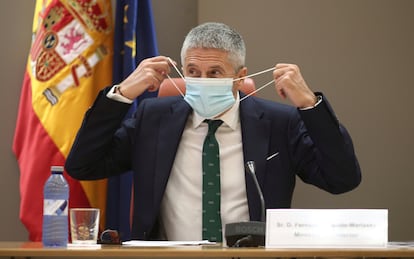Spain resorted to ‘gag law’ more than ever before during coronavirus lockdown
Within the first 75 days of confinement, the Interior Ministry issued nearly 1.1 million sanctions, up 42% from the amount handed out between 2015 and 2018

When Pedro Sánchez, leader of the Spanish Socialist Party (PSOE), launched a successful no-confidence motion in Congress that put him in the prime minister’s office in June 2018, he said that one of his priorities would be to reform the Citizen Safety Law, popularly known as the “gag law.”
The controversial legislation, approved by the Popular Party (PP) in 2015, was criticized from day one for impeding freedom of expression because it established fines for doing things like protesting in front of parliament or taking and sharing photographs of police officers. The opposition claimed it was a way to clamp down on the street protests taking place at the time against political corruption and mismanagement of the economic crisis.
But the “gag law” will turn five years old this Wednesday, and not only has it not been repealed or reformed, it has actually been used more than ever in recent times, under Sánchez’s administration.
During the first 75 days of coronavirus lockdown in Spain, there were a total of 1,089,917 proposed fines against violators of the confinement measures. This is a 42% increase over all sanctions during the first three and a half years that the law was in effect. And Interior Minister Fernando Grande-Marlaska recently announced that repealing the Citizen Safety Law would not eliminate Section 36.6, which sets out fines of €601 to €30,000 for disobeying law enforcement officers. This is the article that’s been most often resorted to during Spain’s state of alarm, which was introduced in mid-March and lifted on June 21.
Despite all the debate, the law has survived two early elections, one failed political term and a health crisis. Former Prime Minister Mariano Rajoy was able to secure its passage in 2015 thanks to his absolute majority in Congress, but there have been several attempts since then to repeal or reform it. Opposition parties, with the PSOE at the helm, challenged the constitutionality of several sections, but the Constitutional Court has yet to issue a decision, partly because the progressive and conservative judges on the panel have so far been unable to reach an agreement on the more controversial aspects of the law.
But there are political hurdles as well as legal ones. Following the no-confidence vote of late May 2018, parliamentary groups began working on a negotiated reform to the Citizen Safety Law. In November of that year, a draft was presented by the Basque Nationalist Party (PNV) and other groups proposed over 200 amendments to it. A preliminary agreement was reached, but parliament was dissolved ahead of time to make way for the early election of April 28, 2019 and work ground to a halt.

The vote gave a victory to the PSOE but Sánchez was unable to form a government, leading to yet another early election in November, which was also won by Sánchez. The Socialist leader heads a minority government in coalition with the leftist Unidas Podemos, and the alliance originally included a pledge to replace the gag law with a new piece of legislation.
But the health crisis triggered by the coronavirus pandemic has not only postponed these efforts, it was actually breathed new life into the Citizen Safety Law, which was widely used by the Interior Ministry to sanction individuals who broke the stay-at-home orders.
Between March 14 – the day that the government decreed a state of alarm – and June 1, the last day with available figures from law enforcement agencies, there were 1,089,197 sanction proposals, up 42% from the 765,416 that were issued between 2015 and 2018.
This has led to numerous complaints, even from the PSOE’s coalition partner Unidas Podemos. Meanwhile, the Ombudsman has for years been urging political parties to reform the law. And Amnesty International will this Tuesday hand Congress a petition with 142,000 signatures demanding its repeal. The human rights group says that 70% of all sanctions issued under this law between 2015 and 2018 were based exclusively on two sections, including 36.6, the one used during the state of alarm.
At a congressional appearance on April 23, Interior Minister Fernando Grande-Marlaska reiterated the government’s commitment to repealing the “gag law,” but he also warned that “there are sections that will always have to be included in the next law,” alluding to Section 36.6.
Out of the nearly 1.1 million proposed sanctions during the first 75 days of the state of alarm, over half were made by the National Police and the Civil Guard, followed by regional and local law enforcement. Andalusia and Madrid account for the highest number. In Catalonia and the Basque Country, the majority of sanctions were issued by the regional police forces, the Mossos d’Esquadra and the Ertzaintza respectively.
English version by Susana Urra.
Tu suscripción se está usando en otro dispositivo
¿Quieres añadir otro usuario a tu suscripción?
Si continúas leyendo en este dispositivo, no se podrá leer en el otro.
FlechaTu suscripción se está usando en otro dispositivo y solo puedes acceder a EL PAÍS desde un dispositivo a la vez.
Si quieres compartir tu cuenta, cambia tu suscripción a la modalidad Premium, así podrás añadir otro usuario. Cada uno accederá con su propia cuenta de email, lo que os permitirá personalizar vuestra experiencia en EL PAÍS.
¿Tienes una suscripción de empresa? Accede aquí para contratar más cuentas.
En el caso de no saber quién está usando tu cuenta, te recomendamos cambiar tu contraseña aquí.
Si decides continuar compartiendo tu cuenta, este mensaje se mostrará en tu dispositivo y en el de la otra persona que está usando tu cuenta de forma indefinida, afectando a tu experiencia de lectura. Puedes consultar aquí los términos y condiciones de la suscripción digital.








































